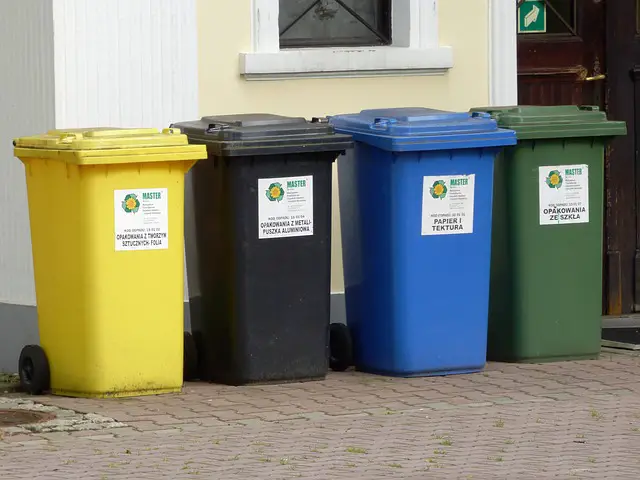There can be confusion about what to put in different bins at home.
In this guide, we outline what can be put in these bins, such as general waste, recycling, and compost/organic waste bins.
NOTE: industrial and commercial waste collection and bins will have different requirements to residential – this is a residential guide only.
How To Know What To Put In Your Bins At Home
Each Local Area Is Different
Usually, different municipalities have different colors of bins provided for curbside collection.
Each color of bin is for a different waste stream.
Common Bins Provided
In developed countries with established waste systems, common bins provided for curbside collection waste streams are a general waste bin which might be one color, a recycling bin which might be another color, and an organic waste bin which might be another color.
Specialized Bins
Some municipalities may even have other specialized waste bins that are provided separate to these waste streams.
Separate Drop Off Location Bins
In some cities, there may also be bins provided that are separate to curbside collection bins and are in a drop off location.
These bins are a separate waste management program to the one provided by a local council or local waste collectors.
Examples might include battery recycling, and also textile recycling programs.
How To Find Out What You Can Put In Your Bins At Home
You can usually do a quick local search similar to this one ‘What can I put in my bins in [insert your city or suburb name]’
The local council should have information on your curbside collection program, the different color bins, and what can and can’t be put in each of them.
Ring your local council if you have specific questions to ask.
Examples Of Local Waste Collection Programs
– San Francisco, California
As of 2019, SF has a blue recycle bin, a green composting bin, and a black landfill/general waste bin.
In the recycling bin, you can put some types of paper, cardboard, metal, plastic, glass, cartons and fabric
In the composting bin, you can put some types of food scraps, food containers, yard trimmings, wood, organic material, and compostable containers.
In the general waste bin, you can put some types of polystyrene foam, pet poop and kitty litter, incandescent light bulbs, toothpaste tubes, menstrual and sanitary items, diapers, mixed materials, disposable razors and ice packs, disposable gloves, shiny food wrappers, and broken glass and pottery
It’s recommended to specially dispose of (by contacting a listed of specialist waste organisation) the following waste (and not put them in any of the other bins provided) – hazardous waste, household products, bulky items, medicine, batteries, electronics, and items like clothes that can be donated and re-used.
Read more about the specific items you can put in each bin at sfrecycles.org
– Phoenix, Arizona
The recyclereminders.com and phoenix.gov resources include information on what can and can’t be recycled
– City Of Melbourne, Australia
As of 2019, the City Of Melbourne offers a general waste, and a recycling bin.
Compost bins are not offered as standard waste collection, but organic waste pickup can be organised.
In the general waste bin, you can put general rubbish, nappies (wrapped), meat and bones, food scraps (see also Home composting), broken ceramics and crockery, broken glass from drinking glasses, Pyrex, mirrors or windows, light globes, and non recyclable plastic.
You can’t put the following waste in the general waste bin – hot liquid or ashes, oil, chemicals, paints and solvents, corrosive and flammable items, syringes, car parts, soil, timber, bricks or other building materials, unwrapped vacuum dust, and hard plastic containers and other recyclable products.
In the recycling bin, you can put paper and cardboard, aluminium and steel cans, empty aerosol cans, all hard plastic containers including yoghurt, ice cream and take-away containers, glass bottles and jars, milk and juice cartons, pizza boxes, aluminium foil and trays, rigid household plastic items like kitchen storage containers and plastic toys, steel pots and pans (no glass lids), CD cases, and ink cartridges.
You can’t put the following waste in the recycling bin – plastic bags, soft plastics, CDs, DVDs and VCR tapes, expanded polystyrene foam used in take-away coffee cups or packaging for household goods, batteries, ceramics, glass from broken glasses, windows or mirrors, waxed cardboard boxes, food scraps, chemicals, nappies, light globes, syringes and needles.
There is a list of contacts and drop off sites or locations for special waste like chemical waste for example.
Read more at melbourne.vic.gov.au
– Individual Suburbs
Individual suburbs may have different requirements other than those mentioned above.
So, it’s worth searching for information on a suburb based level, in addition to a city or town level.
Sources
1. https://sfrecycles.org/
2. https://www.melbourne.vic.gov.au/residents/waste-recycling/Pages/what-goes-in-your-bins.aspx
3. https://www.melbourne.vic.gov.au/residents/sustainability-at-home/Pages/home-composting.aspx
4. https://www.recyclereminders.com/blog/recycling-guides/a-guide-to-recycling-in-phoenix/
5. https://www.phoenix.gov/publicworks/residential-recycling
','' ); } ?>